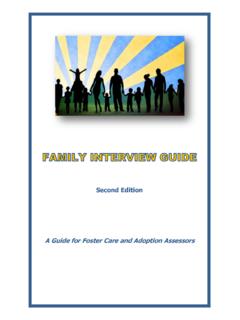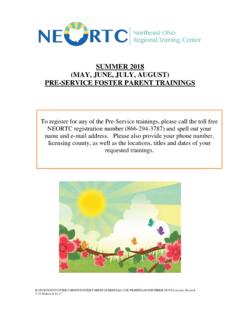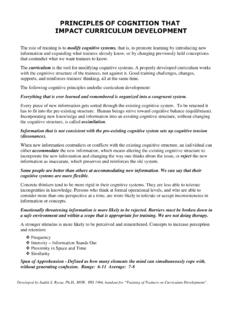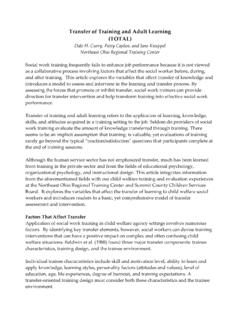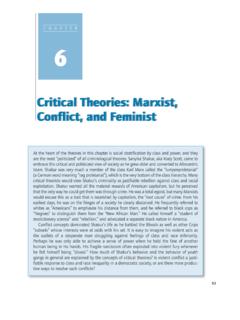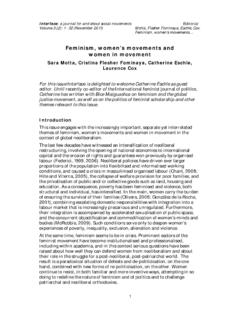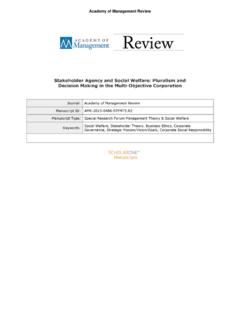Transcription of Cultural Issues in Foster Care - OCWTP
1 Handout 1 Cultural Issues in Foster care , 200911 WelcomeCultural Issues in Foster CareDealing with the Dynamics of Difference2 Complete the sentences on posters with the provided Scavenger Hunt! Use Handout #2, and find someone in the room who fits each of these statements. Write that person s name in the box. Who has the most complete boxes?Handout 1 Cultural Issues in Foster care , 200924In your groups, Name Number of years fostering How would you describe yourself culturally?5 Agenda Introductions/Setting the Stage Let s Define Culture Values and Codes of Conduct Misconceptions Errors in Assessing Culture Identity Development Strategies for Caregivers Wrap-Up and Transfer of LearningCompetencies and Learning Objectives Knows what culture is and can recognize its influence on behavior Understands how differences in Cultural beliefs and standards of behavior can lead to misconceptions about others Knows how to honor the child s Cultural values, norms, and practices in the caregiving home Understands the rights of parents whose children are in placement, and knows how to respect those rights Can model management of Cultural differences with the child through open discussion and celebration of each other s culture6 Handout 1 Cultural Issues in Foster care .
2 200937SO WHAT IS CULTURE?FoodAppearanceEducation, EmploymentShared HistoryArt, MusicRecreationValuesNormsRules, RolesPoliticsGeographyCodes of Conduct8 CultureCultureCultureCultureis a system of values, beliefs, attitudes, traditions, and standards of behavior that governs the organization of people into social groups and regulates both group and individual held beliefs about what life and people should be like, what is good and bad in life, and what is right and wrong. Handout 1 Cultural Issues in Foster care , 2009410A code of rules and standards of conduct encouraging behavior that is consistent with a culture s of Conduct11In your Consider your scenario. Discuss the following questions:1. Is there a Cultural issue here, or is this simply misbehavior?2. How would you feel if you landed in a family where this was the norm?
3 3. Imagine a child with this code of conduct enters your home. How would you handle it?4. How does this awareness impact the way you relate to Foster children and their birth families?12 Residual Rights of Primary Parents Reasonable visitation Responsibility for support Privilege to determine the child s religious affiliation Ohio Revised Code 1 Cultural Issues in Foster care , 2009513 Avoid liability due to residual rights of parents regarding Meet with birth parents and worker to discuss religious practices of birth family Write a note outlining religious practices of birth family If birth parents agree to allow child to attend services with Foster family, include this permission in note (birth parents sign) Agency provides respite if birth parents do not give permission for child to attend services with Foster family Foster parents respect Cultural practices based on religious beliefs or traditions (diet, clothing, etc.)
4 14 Misunderstandings in Communication Eye contact Social distance and touching Informality and formality15 Misunderstanding We see something that conflicts with our codes of conduct, but we ask about the behavior and learn about the values reflected by that unfamiliar code of We see a behavior reflecting an unfamiliar code of conduct. We ask about the behavior, but we answer the question ourselves. Handout 1 Cultural Issues in Foster care , 2009616 Errors in Assessing CultureA continuum of gives us a sense of stability in the world and within ourselves. It has unlimited : Qualities that distinguish one person from anotherInwardly: How we think and feelOutwardly : How we behave and how others view usHandout 1 Cultural Issues in Foster care , 2009719 Definition of IdentityValues & beliefsEthnic/ Cultural HeritageKnowledge and SkillsPersonal and Family HistoryHopes and DreamsTalents and AbilitiesLikes and DislikesFearsWays of Expressing EmotionPhysical Characteristics/-AppearanceMemoriesSexua lity20 Persons of Difference People who are differently abled Different religious orientations Urban/Rural Different geographic regions Different languages Gay, Lesbian, Bisexual, Transgender, Questioning Others?
5 21 Develop culturally relevant strategies for For hair and skin care For handling holidays For dealing with diet and food Issues For developing understanding of history and pride in identity with a group For dealing with appearance and musicHandout 1 Cultural Issues in Foster care , 2009822 Cultural competence is a journey Where are you on the journey? What are you taking home from the workshop? Is there something you are leaving behind at the workshop?Resource Handout #1 Cultural Issues in Foster care : Dealing with the Dynamics of Difference page 1 of 2 Ohio Child Welfare Training Program 2009 AGENDA I) Introductions and Setting the Stage II) Let s Define Culture III) Values and Codes of Conduct: Concerns for Caregivers IV) Misconceptions V) Errors in Assessing Culture VI) Identity Development VII) Strategies for Caregivers VIII) Wrap-Up and Transfer of Learning COMPETENCIES 927-01-001 Knows what culture is and how it is different from race and ethnicity 927-01-002 Understands the importance of Cultural values, norms, and practices 927-01-003 Understands families may have different values and standards of behavior.
6 Or families may share values but have different standards of behavior 927-01-004 Understands how differences in Cultural beliefs and standards of behavior can lead to misconceptions about others 927-01-005 Can recognize and respect the impact of culture on behavior 927-02-001 Knows how a different Cultural viewpoint can affect relationships with Foster or adopted children and their families 927-02-002 Knows ways their own Cultural beliefs, values, and standards of behavior may differ from the child s 927-02-003 Knows why it is important to include the child s Cultural background in caregiver family practices and celebrations 927-02-004 Knows how to honor the child s Cultural values, norms, and practices in the caregiving home 927-02-005 Can use knowledge about the child s culture to help guide the child s development, promote positive self-esteem, and help the child adjust in the caregiving/adoptive home and community 927-03-001 Understands how a Foster , kinship or adoptive child may experience problems in the school or community related to Resource Handout #1 Last printed 5/28/2010 11:59:00 PM.
7 X:\IHS Resource (G Drive)\Products (Current Final Versions)\Ohio\ OCWTP \Fundamentals of Fostering\Culture\handouts\Resource Handouts\RDO 1 agenda comps Page 2 of 2 Cultural differences 927-03-002 Knows how to help children who encounter prejudice related to their culture, race, or other differences 928-02-001 Understands the rights of parents whose children are in placement, and knows how to respect those rights 927-03-003 Can model management of Cultural differences with the child through open discussion and celebration of each other s culture Activity Handout #2 Cultural Issues in Foster care : Dealing with the Dynamics of Difference page 1 of 1 Ohio Child Welfare Training Program 2009 Cultural SCAVENGER HUNT Who can explain what Hispanic means? Who has attended a pow-wow? Who has traveled to 6 or more countries?
8 Who plays a musical instrument? Who has hosted or recently met someone from another country? Who is a first, second, or third generation American? Who has lived on a reservation? Can name 4 non-American leaders who have worked for world peace? Who has participated in a Kwannza Celebration? Who speaks and understands two or more languages? Who has eaten 3 or more different Asian foods ( Thai, Korean, Vietnamese, Hmong)? Who knows the definition of a feminist? DIVERSITY BINGO YOUR NAME GOES HERE! Who has attended a quincea era? Who comes from a family of five or more children? Who can recite a Maya Angelou poem? Who knows when National Coming Out Day is and what it is about? Who has a hidden disability? Knows 2 core differences between Jewish and Christian beliefs. Who has participated in a Seder Celebration? Who has a family member who has a disability?
9 Who knows what ageism is? Who has a great sense of humor? Who has seen the movie Boys Don t Cry? Knows what language is spoken by most people worldwide Resource Handout #3 Cultural Issues in Foster care : Dealing with the Dynamics of Difference page 1 of 1 Ohio Child Welfare Training Program 2009 Parents Residual Rights Foster parents are required to respect the religious practices and beliefs of the birth parents, even though the child is in the temporary custody of the child-placing agency. If the Foster parents take a Foster child to their church, without the consent of the birth parents, the Foster parents and the agency may violate the right of the birth parents to choose the religious beliefs of the child. To avoid liability, and to respect the rights of the birth parents, Foster parents should do the following: Have a meeting with the birth parents and the caseworker to discuss the religious practices of the birth family; Write a note, signed by all in attendance, outlining what the religious practices of the birth parents are; If the birth parents agree that the Foster parents can take the child to the Foster parents place of worship, make sure that the note includes that permission; If the birth parents do not give permission for the child to attend the Foster parents place of worship, the note should include a statement that the agency will provide relief care for the child so that the Foster parents may practice their own religion.
10 If the birth parents have Cultural practices that may be based on religious beliefs, such as the avoidance of certain foods or the wearing of traditional clothing, the note should indicate that the Foster parents will respect these Cultural practices. If major Issues are not resolved at the meeting, the Foster parent and caseworker should meet with the agency attorney for guidance. Resource Handout #4 Cultural Issues in Foster care : Dealing with the Dynamics of Difference Handout #6, page 1 of 3 Ohio Child Welfare Training Program 2009 DIFFERENTIATING STEREOTYPING FROM CULTURALLY RELEVANT INFORMATION Stereotypes are generalized statements about the presumed characteristics of a particular group of people and its members. The greatest danger of negative stereotypes is that they have the potential to communicate misinformation and promote misjudgments about Cultural groups and their individual members.
